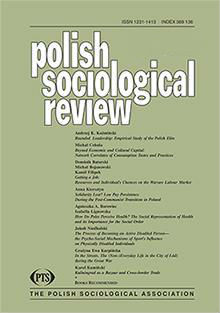Intra-Generational social Class Mobility in Hungary Between 1992and 2007- the Role of Self Confidence
Intra-Generational social Class Mobility in Hungary Between 1992and 2007- the Role of Self Confidence
Author(s): Tamás KellerSubject(s): Social Sciences
Published by: Polskie Towarzystwo Socjologiczne
Keywords: intra-generational class mobility; personality trait; self-confidence; the impact of non-cognitive skills; panel data; Hungary
Summary/Abstract: This paper analyses the intra-generational social class mobility in Hungary between 1992 and 2007 using Hungarian panel data. Social class position is used as an occupation based typology corrected with a social status index (containing income, wealth and housing dimension). Self-confidence reflected respondents' problem solving skills, determination, efficacy and optimism. Mobilizing the gain of panel data self-confidence was set to be stable over time and was measured prior to social class position (in order to avoid endogenity). The results of multivariate logit models showed that self-confidence has an impact on working class and deprived class position in 2007, even after controlling prior class position measured in 1992. People with high self-confidence were less likely represented in the deprived position and were more likely to belong to the working class. The decomposition of total effects of self-confidence into direct and indirect effects (mediated by schooling) revealed that in the case of higher status, social classes (elite, upper middle class, and middle class) self-confidence also had a significant impact however this was mainly transmitted through the channel of education.
Journal: Polish Sociological Review
- Issue Year: 175/2011
- Issue No: 3
- Page Range: 373-292
- Page Count: 19
- Language: English

